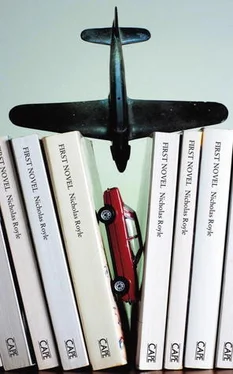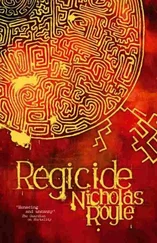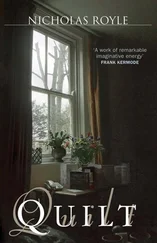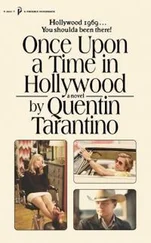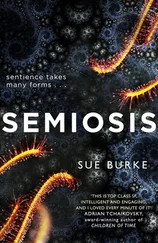He shouted upstairs, ‘We’ll be leaving in a couple of minutes, Grandad.’
There was no answer.
‘Come on, Nana.’
They left the house and Nicholas started the car. They sat in it for a few moments with the engine running and then Nicholas depressed the clutch and selected first gear.
‘Just a minute, love,’ Nana said.
Nicholas looked out of the side window, which allowed him to see the front of the house. Everything was still. Then he saw movement behind the frosted glass and the front door swung inwards and his grandad appeared. He closed the door, locked it and stumped down the path. He stood at the kerb by the passenger door, clearly expecting his wife to give up her space in the front seat for him. With a barely perceptible sigh, she opened her door and eased herself out of the car. Nicholas shook his head and stared out of the windscreen. His grandfather lowered himself into the front seat, leaving the door to be closed for him, and then Nana climbed into the back.
‘All set?’ Nicholas asked and didn’t wait for a response.
When Nicholas saw the look on his father’s face as the three of them walked on to the ward, he knew it had been worth it. Fearful, grateful, relieved, humble: all of these expressions guttered like dying candles in the recesses of his sockets. Nicholas watched his grandad progress slowly down the ward, every muscle contracted, making sure he came into physical contact with nothing that might infect him. Nana had cast her eyes on her son the moment she’d stepped through the door and she allowed his deep-set gaze to reel her in without any concern for her surroundings.
They sat around the bed. Nicholas had taken his father’s hand and given him a hug, as much to show his grandparents there was nothing to fear as for the contact itself, but so far they had kept their hands to themselves. Nicholas went to get some drinks and when he came back he observed that Nana had moved closer to the bed and was holding her son’s bony, cannulated hand.
Nicholas spoke to the consultant to ask if he should try to persuade his grandparents to stick around for a night or two. The doctor said Ray was not in immediate danger, but that he was unlikely to be leaving the ward any time soon.
‘If at all?’ Nicholas asked.
‘Your father is at the end stage.’
Nicholas drove his grandparents back to Hyde that evening. There had been a handshake between Ray and his father, and Nana had kissed her son and hugged him and cried. Nicholas saw them back into the house and turned down the offer of a bed. He embraced his nana and thanked her and shook his grandad’s meaty hand, the old man’s grip still fiercely strong, and thanked him too. Nana, in turn, thanked him for taking them and bringing them back; his grandfather remained silent on the issue, but Nicholas was confident he had done the right thing, at least by his father.
Ray died three weeks later, at 10.17 a.m. on 19 April 1992. Nicholas was with him, holding his hand, having gone to visit on his way into work. Ray had been conscious for the first hour of the visit and Nicholas had told him that just the night before he and Liz had taken the decision to do something they had been considering for some time: they were going to adopt a child. Nicholas said that while theirs might not have been the most conventional father — son relationship, it had ultimately inspired him to become a father himself.
‘I don’t know,’ he joked to Ray, ‘I get the sense you’ve enjoyed being a dad and I want some of that, too.’
In response, he felt the slightest increase in pressure from his father’s grip.
Nicholas also reassured him that the publishers were very happy with the new collection and were pressing ahead with publication in the autumn.
‘Thank you, by the way,’ Nicholas said, ‘for the dedication. It means a lot to me.’
This time there was no answering squeeze. His father had gone.
The funeral, at Highgate Cemetery, was well attended. Nicholas recognised a lot of people from the party his father had thrown for him and Liz at the flat in Camden Town. One or two patients from Broderip Ward came and the consultant was spotted at the service, too. Ray’s parents both made the trip; Liz looked after them for the day.
‘I’ll be next,’ said Nicholas’ nana. ‘You wait and see.’
‘You’re as fit and healthy as me,’ Nicholas said. ‘Healthier, I suspect.’
‘I’ve got a line of tablets to take every morning as long as your arm,’ she said.
‘It’s this new GP she’s seeing,’ said Nicholas’ grandad. ‘I think he’s trying to keep the pharmaceutical companies in business.’
‘I don’t think they need much help,’ Liz said with a laugh.
‘Isn’t there an argument that says they have to charge a lot for drugs to fund new research?’ said Nicholas.
‘There’s certainly a lot of money being spent on research for HIV and AIDS drugs,’ Liz agreed.
They fell silent.
As part of the service, Nicholas read an extract from the title poem of his father’s forthcoming collection.
The Sniper was published in the autumn, as planned. Nicholas and Liz hosted a small launch party at the flat in Camden, which Ray had left to them in his will, much to their surprise as they had not known he even owned it. Nicholas discovered it had been a present to Ray from David, the architect. David, it turned out, had been providing Ray with financial support for years. They had had a long-term open relationship.
At the party, Nicholas said a few words on his father’s behalf. He kept half an eye out for a balding intruder wearing a velvet jacket that might by then have become fashionable again, but there was nothing to worry about on that score. The party was well attended and some appreciative reviews followed in the poetry press, alongside respectable notices in the TLS , the Guardian and Time Out (by the poetry editor, who could be considered impartial).
Nicholas and Liz registered with the Adoption Agency and got the ball rolling there. They filled in a hundred forms and submitted to a thousand interviews, or so it began to seem to them. They took to observing certain parents when they were out and about — and Liz sometimes came across them in the NHS — and they wondered why such people were not subjected to the same rigorous testing they were having to go through. They read about cases in the news involving parents’ abuse of children. They became extremely sensitive to the subject. Nicholas’ own unusual upbringing was the subject of particular scrutiny.
‘Anyone would think we were convicted murderers or rapists,’ Liz said, aghast at the latest test of suitability.
‘Or drug addicts who are going to leave needles lying around for their adopted children to play with,’ Nicholas added, similarly disgruntled.
There were numerous false starts and delays and there were times when one or other of them started to lose the will for battle. But finally, in spring 1994 they had their first face-to-face meeting with Jonny, who was very nearly four years old. He was very quiet and withdrawn, uncomfortable meeting people and uncomfortable, it seemed and according to the reports, with himself — with his body, his intellect, his emotions. But he had been through some tough times, like a lot of children up for adoption. He had seen some trauma. Nicholas and Liz were put fully in the picture, but they didn’t hesitate for a moment. Liz said later that she felt as if her heart jolted or shifted position on meeting him. She knew it was silly, she added, because it’s not even in the heart that you really feel these things, but in the stomach or gut, but she insisted on the heart. She felt, she said, that when he reached out his little hand to shake hers, he didn’t stop there but carried on somehow and his hand passed into her chest where it grasped her heart and gave it a squeeze.
Читать дальше
